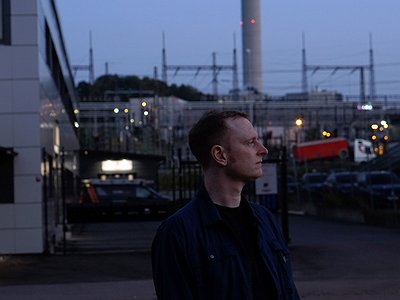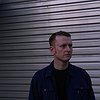Part 1
Name: Linus Hillborg aka Atonet
Nationality: Swedish
Occupation: Composer, musician
Current Release: Magelungsverket on Moloton
Recommendations: EarthBound / MOTHER2 ギーグの逆襲 (Ape Inc. / HAL Laboratory, 1994); Kallocain (Karin Boye, 1940)
If you enjoyed this interview with Linus Hillborg and would like to find out more about his work, visit his instagram profile for more information.
When did you start writing/producing music - and what or who were your early passions and influences? What what is about music and/or sound that drew you to it?
I don’t know really, I don’t remember that well. I started writing and producing stuff when I was 13-14 (so way back in like 2003), playing electric guitar and recording through my mom’s old 2-track tape portastudio. I mostly played and listened to metal.
I do have a clear memory of the first time plugging an electric guitar into an amplifier and pushing the button for high gain distortion, hearing that screeching sound - I was very excited and inspired and at the same time surprised it was that ‘easy’ to create a distorted guitar sound. I’d imagined it would involve some kind of special playing technique or similar, that would take a long time to master. So I guess … distortion? Haha.
For most artists, originality is first preceded by a phase of learning and, often, emulating others. What was this like for you? How would you describe your own development as an artist and the transition towards your own voice? What is the the relationship between copying, learning and your own creativity?
I’m still learning and will probably never stop, there’s just too much interesting stuff out there. As a teenager I used to sit at the computer, obsessively transcribing songs in the tablature software Guitar Pro 3. You’d transcribe all parts, including drums, and hear them in General MIDI sounds, experimenting and trying to make them sound cool. I think I transcribed the whole album Chaos A.D by Sepultura among others, and made my own songs as well. I’d play some of them with other people in bands. I guess you could call that a first phase of emulating, but I didn’t see it as that … I just did it because it was fun I guess.
I eventually moved on to do similar things with improvised and electronic music. In regards to recording on a 2-track, I don’t think I knew of anything to emulate, I just tried stuff and experimented. I think I still learn and experiment in these same ways, although not with the same amount of time on my hands as when I was a kid.
Anyways, I don’t think I could really distinguish originality in my own material, much less a transition between emulation and originality. I find some comfort in thinking of artistic expressions as the result of accumulated knowledge through history, individual and cultural manifestations intertwining endlessly, shaped by material circumstances and whatever, so the new and original utterances that eventually take shape in a larger cultural context aren’t really isolated to one single artist. I don’t think there is a linear transition from emulating others to creating something ‘original’ - I’d guess there are probably examples of both in very early as well as more mature work of any given artist.
What were your main compositional- and production-challenges in the beginning and how have they changed over time?
I don’t think I perceive them as challenges really, but rather problem-solving, which kind of spawns creativity. I remember discovering that I could mix down both channels on a 2-track to one, leaving one free for overdubs, and do that over and over to make more overdubs. I discovered it out of necessity, like ‘I want to add more tracks, how do I do that?’. I thought that was cool, even though it was a destructive process, so if something went wrong it had to be redone from scratch or just left as is.
I did that for years - I don’t think I even knew what a multitrack DAW was. When I eventually moved on to using one later on, I stumbled upon a free version of Cool Edit Pro, which opened up new possibilities. If I’d started with the computer though, I probably wouldn’t have known that destructive process from before. In retrospect, I reinvented the wheel, and kind of unknowingly got a lesson in how things had been done earlier in the history of recording. But I feel making those discoveries on your own as opposed to just reading about them can be rewarding. Problem-solving experiences like these have probably affected my compositional process a lot.
What was your first studio like? How and for what reasons has your set-up evolved over the years and what are currently some of the most important pieces of gear for you?
Apart from those early experiences, my first studio was in the shared-space artist collective Tropiska Föreningen (in Stockholm). I still have a spot there, although I’m renting it out at the moment while I’m studying because I have access to studio spaces in school (studying electroacoustic music at the Royal College of Music in Stockholm).
My setup has been kind of simple over the years and not changed much, I’ve basically had a computer, some crappy synths and a couple of old tape machines. Recently I’ve gotten into audio synthesis programming and algorithmic composition (mainly in SuperCollider) as well as modular synthesis, so maybe the setup will evolve a bit after I graduate and go back to my old spot.
I’d say to this day, tape is still my favourite thing to work with. But yeah, programming customised frameworks as I’ve been learning lately is exciting.
How do you make use of technology? In terms of the feedback mechanism between technology and creativity, what do humans excel at, what do machines excel at?
Even though new technologies can open up possibilities, they all have their inherent limitations, which can function as sounding boards for new ideas. For me, this applies to anything from notation with paper and pen to audio programming environments. As soon as I want to do something that the tool I’m using wasn’t specifically designed for, I don’t even have to be well-versed with it to run into limitations that have to be overcome somehow, which forces me to find new paths and perspectives and in turn informs me creatively. When working by myself, this type of machine feedback functions similarly to the process of working together with another human.
Production tools, from instruments to complex software environments, contribute to the compositional process. How does this manifest itself in your work? Can you describe the co-authorship between yourself and your tools?
I’ve already touched upon this, but yeah, my work is formed by tools and most importantly, their limitations. I know this is kind of a cliché sentiment, but I think it’s interesting to not think of it as purposefully setting up limitations for yourself, but rather that the tools you use - and there is a lot to choose from today - will have a certain design, and that will affect the outcome. If there would have been tools to do basically anything imaginable, I don’t think I’d know where to start really.
Collaborations can take on many forms. What role do they play in your approach and what are your preferred ways of engaging with other creatives through, for example, file sharing, jamming or just talking about ideas?
I tend to look upon collaboration not only as specific collaborative projects, even though I do them, but in terms of always being collaborative, as opposed to competitive. It could be anything from fixing someone’s old laptop to exchanging ideas.
Could you take us through a day in your life, from a possible morning routine through to your work? Do you have a fixed schedule? How do music and other aspects of your life feed back into each other - do you separate them or instead try to make them blend seamlessly?
I’d love to have a fixed schedule but at the moment that isn’t possible. When working in many different types of projects, involving anything from composing and doing sound engineering work to playing live and recording as a musician, the schedule changes all the time.
Life and music inevitably feed back into each other, for me at least. The last few years I’ve been studying music, which has allowed me more time to focus on learning new techniques, discussing music with others, delving into theory and my own process. That definitely changes the character of the resulting output.
Before, when I used to work with music in the studio and playing shows while also working a lot in part-time jobs, trying to go to gigs and drink beer or whatever, I was stressed for time and energy and the results were different, more improvised and immediate as opposed to composed and contemplative. Time makes that difference, for better or worse. I think nowadays I’m able to channel both dispositions.






